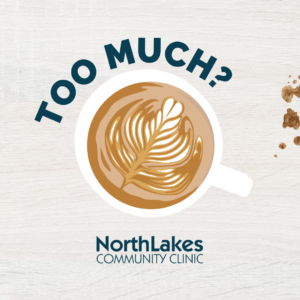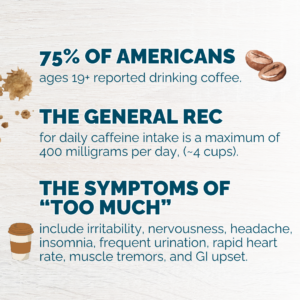Submitted by Lori Cannon, MSN, RN
NorthLakes Community Clinic
“Don’t talk to me until I’ve had my coffee.”
 Coffee is a beverage of choice for the vast majority of American adults. According to the National Institutes of Health in 2016, 75% of Americans over the age of 19 reported drinking coffee. Most of us drink it daily and consider it a prerequisite for a decent start to the day. There are a lot of health benefits to regular coffee consumption, but too much of a good thing is, well, bad. So just how much coffee is too much? Let’s take a look.
Coffee is a beverage of choice for the vast majority of American adults. According to the National Institutes of Health in 2016, 75% of Americans over the age of 19 reported drinking coffee. Most of us drink it daily and consider it a prerequisite for a decent start to the day. There are a lot of health benefits to regular coffee consumption, but too much of a good thing is, well, bad. So just how much coffee is too much? Let’s take a look.
A note before we dive in: the discussion and advice in this article around coffee and caffeine intake is intended for healthy non-pregnant adults without preexisting conditions. Some folks are more sensitive to the effects of caffeine, and some have health conditions or take medications that require lower or no caffeine intake. Always discuss your individual concerns with your medical provider and follow their guidance.
When we talk about drinking too much coffee, what we’re really talking about is too much caffeine. Caffeine is the active ingredient in coffee; it’s why we want it first thing in the morning. As a stimulant, caffeine helps us feel more alert and can help our brain process information faster. Caffeine is also found in other food and beverages, especially energy drinks and some soft drinks. For most of us, drinking a couple of cups of coffee a day gives us the boost we need to get things done. The general recommendation for daily caffeine intake is a maximum of 400 milligrams per day, or about 4 cups of brewed coffee, for a healthy adult.
That said, there are people with a lower tolerance for caffeine who will experience side effects from that kind of intake. Unpleasant symptoms of too much caffeine include irritability, nervousness, headache, insomnia, frequent urination, rapid heart rate, muscle tremors, and GI upset. If you find yourself experiencing any of these symptoms, you can try cutting back on your caffeine intake and see if it helps.
 If you’re currently drinking two pots of coffee a day with none of those side effects, that doesn’t mean you have nothing to worry about. Long-term heavy coffee drinkers can develop a tolerance to the sensation of caffeine on the central nervous system, but it’s still affecting the body. Consider reducing your caffeine intake gradually and check labels to identify caffeine in other drinks and foods. Abruptly decreasing or stopping your caffeine intake can cause withdrawal symptoms of headache, irritability, and brain fog, so go slow!
If you’re currently drinking two pots of coffee a day with none of those side effects, that doesn’t mean you have nothing to worry about. Long-term heavy coffee drinkers can develop a tolerance to the sensation of caffeine on the central nervous system, but it’s still affecting the body. Consider reducing your caffeine intake gradually and check labels to identify caffeine in other drinks and foods. Abruptly decreasing or stopping your caffeine intake can cause withdrawal symptoms of headache, irritability, and brain fog, so go slow!
If you’re concerned or have questions about your caffeine or coffee intake, a discussion with your primary care provider is in order. Odds are you can continue to enjoy that morning cup of coffee, even if you need to make a few adjustments. No primary care provider? NorthLakes has a variety of excellent medical providers currently accepting new patients! Call 888.834.4551 to get scheduled.
Lori Cannon is the Clinical Quality Improvement Manager at NorthLakes Community Clinic.




